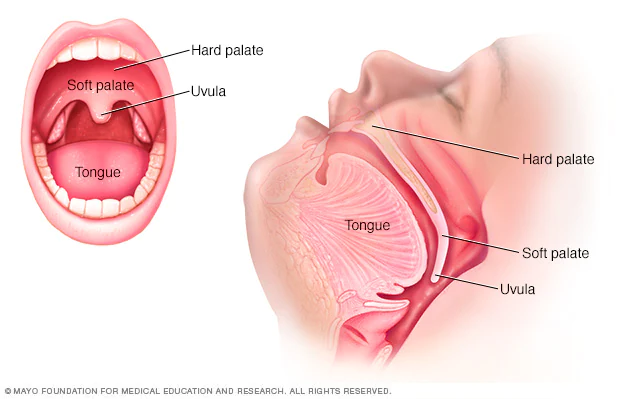Soft palate cancer begins in the cells of the soft palate. Your soft palate is located on the upper portion of the back of your mouth, behind your teeth.
Soft palate cancer is considered a type of throat cancer. Doctors treat soft palate cancer similarly to the way they treat other types of throat cancers — often with a combination of surgery, radiation therapy and chemotherapy.
Symptoms
Some signs and symptoms of soft palate cancer can include the following:
- Bleeding
- Difficulty swallowing
- Difficulty speaking
- Bad breath
- Mouth pain
- Sores in your mouth that won’t heal
- Loose teeth
- Pain when you swallow
- Weight loss
- Ear pain
- Swelling in your neck that may hurt
- White patches in your mouth that won’t go away
When to see a doctor
Talk to your doctor or dentist about any persistent signs and symptoms that worry you.
Causes
Soft palate cancer forms when a genetic mutation turns normal, healthy cells into abnormal cells. Healthy cells grow and multiply at a set rate, eventually dying at a set time. Abnormal cells grow and multiply out of control, and they don’t die. The accumulating abnormal cells form a mass (tumor). Cancer cells invade nearby tissues and can separate from an initial tumor to spread (metastasize) to other parts of the body.
Risk factors
Things that may increase the risk of soft palate cancer include:
- Using tobacco
- Drinking alcohol
- Being infected with human papillomavirus (HPV)
- Taking medications that suppress your immune system
If you use tobacco and drink alcohol, your risk is even higher.
Prevention
Ways to reduce your risk of soft palate cancer include:
- Don’t use tobacco. If you don’t use tobacco, don’t start. If you currently use tobacco of any kind, talk with your doctor about strategies to help you quit.
- Limit alcohol if you choose to drink. If you choose to drink alcohol, do so in moderation. For healthy adults, that means up to one drink a day for women and up to two drinks a day for men.
- Get regular dental care. During your appointment, your dentist will check your mouth for signs of cancer and precancerous changes.
- Consider the HPV vaccine. Receiving a vaccination to prevent HPV infection may reduce your risk of HPV-related cancers, such as soft palate cancer. Ask your doctor whether an HPV vaccine is appropriate for you.


